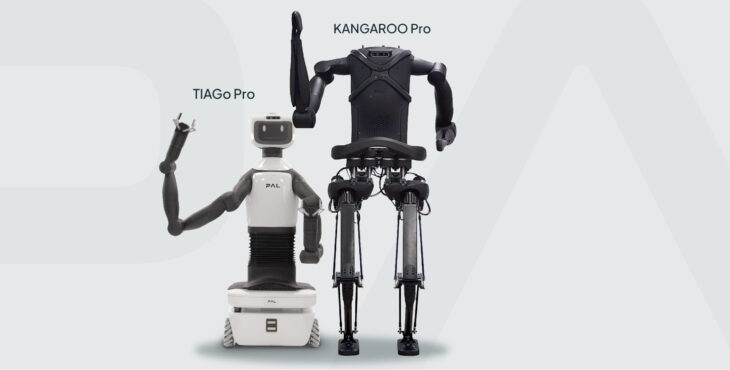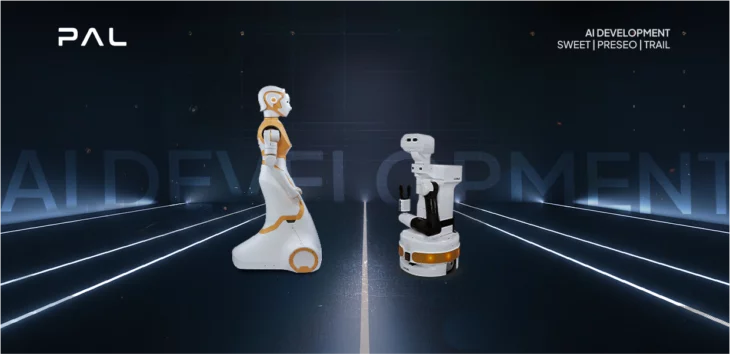Interviewing Georgia Chalvatzaki
Rising star in robotics, Dr. Georgia Chalvatzaki is an independent research group leader of the iROSA group at TU Darmstadt in Germany. Dr. Chalvatzaki was also accepted for the renowned Emmy Noether Programme (ENP) of the German Research Foundation (DFG), enabling outstanding young scientists to qualify for a university professorship by independently leading a junior research group for six years.
In her research group iROSA, Dr. Chalvatzaki and her new team will research the topic of “Robot Learning of Mobile Manipulation for Assistive Robotics”. Dr. Chalvatzaki proposes new methods at the intersection of machine learning and classical robotics, taking one step further the research for embodied AI robotic assistants. The research at iROSA proposes novel methods for combined planning and learning for enabling mobile manipulator robots to solve complex tasks in home-like environments, with the human-in-the-loop of the interaction process.
Dr. Chalvatzaki completed her Ph.D. studies in 2019 at the Intelligent Robotics and Automation Lab at the Electrical and Computer Engineering School of the National Technical University of Athens, Greece.
To date, she has worked on eight research projects, and she has published more than 30 papers, most of which are in top-tier robotics and AI platforms, e.g., ICRA, IROS, RA-L. Her research interests and expertise include human detection and tracking with applications in the field of assistive robotics. She is also a member of institutions including the IEEE Robotics & Automation Society, IEEE Women in Engineering, and Cybernetics Society.
We had the chance to talk with Georgia about her career to date, awards, and her projects, including working with one of her platforms of choice, PAL Robotics’ TIAGo robot.
Getting started: inspiration to start a career in robotics
In response to how she first got interested in the world of robotics, Georgia told us, “as a child I was fascinated by robotics and technology, and at school, we did a project on cutting edge technologies – it was out of luck that the topic was robotics, and by chance, I would say that I found out more about robotics at this point. So I researched, and I found out that you can study robotics if you go to engineering and computer science schools. It was definitely challenging to continue studying all the way through to Ph.D. level, but I’m very happy that I didn’t give up on this dream.”
Award by the Emmy Noether Programme (ENP) and research towards a vision of intelligent robotic assistance
Georgia was recently awarded the Emmy Noether Programme (ENP) of the German Research Foundation (DFG). She told us more about what this means to her and her research plans, “this is one of the most important grants that a young researcher can receive from the German Research Foundation in order to conduct original research work. This means the opportunity to start setting your own research directions as a research group leader – this can lead you in the direction of a professorship, and my dream is to become a professor, so I would like to follow this academic career path.”
“In terms of setting your own research direction, this involves identifying what is missing in the research world, in particular, for us for intelligent robotic assistance and to try to take some steps towards achieving this long-term vision that we have of personal robots in our houses, and in our workplaces for example.”
Research at the iRosa Lab (intelligent robotic systems for assistance) for robust mobile manipulation
Georgia explained more about her research to date at the iRosa lab, “the iROSA is a lab that stands for intelligent robotic systems for assistance. What we are currently researching is the development of novel algorithms for robust mobile manipulation.
We can use robots for manipulating objects in our everyday environment, like items we find inside the house. And to be able to robustly grasp and manipulate objects – for example, opening doors, closing drawers, anything that we can imagine that a mobile assistant, for example, that operates in a domestic environment should be able to do, and it’s not only this area that we are currently focusing on but also the aspect of the interaction with the human.”
Georgia continued, “we cannot imagine a robot that is operating in houses without interacting with humans. So, what I focus on a lot, and one of the research topics that I personally pursue, has to do with the intention recognition of humans. For example, you should be able to predict the behaviour of the human so that you can plan the actions of the robot accordingly. So, this is one aspect to consider.
So, imagine a robot, for example, in a residential home that fetches some medicine or food to deliver to an older person – the robot should not only act in a way that can be trusted but should always be safe because different people act in very different ways. The object should be handed over so that the human can receive it and trust the robot that actually extends the arm to deliver something. This is part of my research, to understand how to interact in a trustful and safe manner with humans.”
Working with TIAGo robot in EU research projects in the iRosa Lab including teleoperation
Georgia explained more about TIAGo++’s role in these projects and the features in the mobile manipulation robot that have been especially useful so far, (TIAGo++ is a dual-armed version of TIAGo) “So, the TIAGo++ I would say is the fundamental research tool for us in all these projects, since we are increasingly interested in the integration of mobility and manipulability.
In the CHIRON project, what is interesting is that we have to teleoperate the robot. Therefore, we have to take advantage of the opportunities that the TIAGo++ gives through the bimanual setting because when humans manipulate objects, they usually use both hands, especially when we have to do some challenging tasks, such as manipulation tasks.
This means that we will have to also control the bimanual manipulation abilities of TIAGo++ in order to achieve the same experience for the user as if he or she was in the area that the robot would teleoperate. So, I think all these features of TIAGo++ allow us to tackle different aspects of different challenges that we have in our projects.”
Robotics to solve complex tasks including for users in their homes in daily life
Regarding how robotics can solve complex tasks, for example, with users in their homes, Georgia stated, “this is a very, very challenging topic; it is the central topic for research at the iROSA Lab. Currently, our robots can do some tasks that have multiple stages that need to be achieved. For example, you can arrange the table in order to have lunch – this is a longer task because you have to take multiple things and place them in a specific order and understand how to place them.
There is a whole logic and not only the manipulation skills but also the logic of executing these tasks. What enhances the problem is the uncertainty of the real environment and also the increased complexity of all these logical concepts that, for a human, are common sense, but for robots, that is not there. This is actually one of the major topics that we want to conquer, not only to learn the skills but also to sequence them. So this will be one of the most important challenges of bringing robots to real-world environments.”
Robotics and a positive contribution to humanity: helping in healthcare, helping at home, helping humans
Georgia explained her view on how robotics can make a positive contribution to humanity, “it’s not only about the lack of personnel that we have in hospitals, and in everyday care, also our lives are becoming hectic, the hours that we spend at work and the different hobbies that a human wants to do. And it will become even more different, I think, in the next few years compared to the past. So, I think that having robots that can execute tasks in households, that can take care of older people or that can help in hospitals, will allow humans to have the time to find other interests to perform their hobbies, for example in art or music.”
Georgia added, “several things potentially will be done by robots in the future, but this gives an increasing advantage to humanity to find out – how can we use the fact that we will have a robot fixing things in our house, for example, in the future? How can we use this extra time to bond with our friends or to do extra activities or to study different things for example?”
We would like to thank Dr. Georgia Chalvatzaki, for taking the time to talk with us. Find out more about the iROSA Lab and their work. To learn about the capabilities of TIAGo robot and the different customizations available, visit our website. Finally, if you would like to ask us more about TIAGo as a research platform, do not hesitate to visit our contact page to get in touch with us.
TIAGo the mobile manipulator robot combines perception, navigation, manipulation & Human-Robot Interaction skills out of the box. TIAGo robot has a modular design and can be configured based on customer needs. TIAGo customizations available include TIAGo Titanium, TIAGo Steel, TIAGo Iron and TIAGo ++, a dual-armed version of the humanoid robot.
If you found this interview interesting, then do not miss out the second part and take a look at all our article in our blog on robotics.


